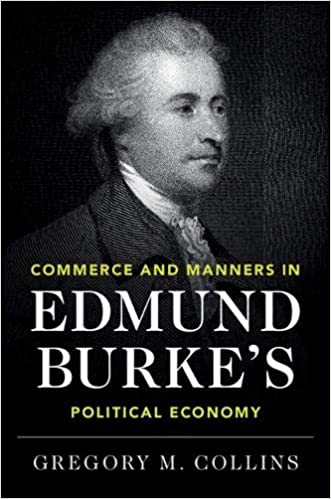Commerce and Manners in Edmund Burke’s Political Economy
By Gregory Collins
 JMC fellow Gregory Collins has recently written a book, Commerce and Manners in Edmund Burke’s Political Economy, on the historical and theoretical context for Burke’s economic beliefs:
JMC fellow Gregory Collins has recently written a book, Commerce and Manners in Edmund Burke’s Political Economy, on the historical and theoretical context for Burke’s economic beliefs:
Although many of Edmund Burke’s speeches and writings contain prominent economic dimensions, his economic thought seldom receives the attention it warrants. Commerce and Manners in Edmund Burke’s Political Economy stands as the most comprehensive study to date of this fascinating subject. In addition to providing rigorous textual analysis, Collins unearths previously unpublished manuscripts and employs empirical data to paint a rich historical and theoretical context for Burke’s economic beliefs. Collins integrates Burke’s reflections on trade, taxation, and revenue within his understanding of the limits of reason and his broader conception of empire. Such reflections demonstrate the ways that commerce, if properly managed, could be an instrument for both public prosperity and imperial prestige. More importantly, Commerce and Manners in Edmund Burke’s Political Economy raises timely ethical questions about capitalism and its limits. In Burke’s judgment, civilizations cannot endure on transactional exchange alone, and markets require ethical preconditions. There is a grace to life that cannot be bought.
Get access to the online version here >>
Click here to order the book from Cambridge University Press or Amazon >>
The Wall Street Journal: “‘Commerce and Manners in Edmund Burke’s Political Economy’ Review: Tradition, Yes, and Markets Too”
By James Grant
“Prudence was the watchword of Edmund Burke, the great 18th-century Irish statesman, except where his own money was concerned. The West’s founding conservative lived his financial life on the edge of disaster. It was a mercy for him that members of Parliament were legally spared the rigors of debtors’ prison.
Money in the abstract was rather where Burke shone, especially in the pages of his immortal “Reflections on the Revolution in France,” published in 1790, a year after the fall of the Bastille.
It cost money to turn a nation upside down, and the sans culottes could scrape up only so much by melting down church bells and expropriating noble estates. Anticipating modern central-banking practices, the new French republic turned to the printing press. Its scrip, the infamous assignat, couldn’t hold a candle to the good-as-gold British pound, as Burke proceeded to demonstrate…”
Read the entire review at the Wall Street Journal >>
 Gregory Collins is a Postdoctoral Associate and Lecturer in the Department of Political Science and Program on Ethics, Politics, and Economics at Yale University. Collins’s scholarly and teaching interests include the history of political thought, the philosophical and ethical implications of political economy, American political development, constitutional theory and practice, and the political theory of abolition. He has published articles on Burke’s economic thought in Review of Politics; Frederick Douglass’ constitutional theory in American Political Thought; Burke’s and Adam Smith’s views on Britain’s East India Company in Journal of the History of Economic Thought; Burke’s plan for the abolition of the slave trade in Slavery & Abolition; and Burke’s intellectual relationship with Leo Strauss and the Straussian political tradition in Perspectives on Political Science. His current book project is a comparative study of the political thought of Scottish Enlightenment thinkers and Burke that addresses questions regarding empire, commerce, morality, and historiography.
Gregory Collins is a Postdoctoral Associate and Lecturer in the Department of Political Science and Program on Ethics, Politics, and Economics at Yale University. Collins’s scholarly and teaching interests include the history of political thought, the philosophical and ethical implications of political economy, American political development, constitutional theory and practice, and the political theory of abolition. He has published articles on Burke’s economic thought in Review of Politics; Frederick Douglass’ constitutional theory in American Political Thought; Burke’s and Adam Smith’s views on Britain’s East India Company in Journal of the History of Economic Thought; Burke’s plan for the abolition of the slave trade in Slavery & Abolition; and Burke’s intellectual relationship with Leo Strauss and the Straussian political tradition in Perspectives on Political Science. His current book project is a comparative study of the political thought of Scottish Enlightenment thinkers and Burke that addresses questions regarding empire, commerce, morality, and historiography.
Collins is a JMC fellow.
Learn more about Gregory Collins >>
![]()
![]() Follow us on Facebook and Twitter for updates about lectures, publications, podcasts, and events related to American political thought, United States history, and the Western political tradition!
Follow us on Facebook and Twitter for updates about lectures, publications, podcasts, and events related to American political thought, United States history, and the Western political tradition!
Want to help the Jack Miller Center transform higher education? Donate today.
